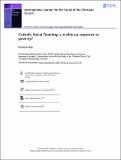Files in this item
Catholic social teaching : a trickle-up response to poverty?
Item metadata
| dc.contributor.author | Kelly, Patricia | |
| dc.date.accessioned | 2022-12-12T15:30:06Z | |
| dc.date.available | 2022-12-12T15:30:06Z | |
| dc.date.issued | 2023-04-06 | |
| dc.identifier | 282155962 | |
| dc.identifier | 7f20de2d-5222-46d1-a152-fd2cc53f1a4d | |
| dc.identifier | 85144186653 | |
| dc.identifier | 000896682800001 | |
| dc.identifier.citation | Kelly , P 2023 , ' Catholic social teaching : a trickle-up response to poverty? ' , International Journal for the Study of the Christian Church , vol. 23 , no. 2 , pp. 206-217 . https://doi.org/10.1080/1474225X.2022.2147769 | en |
| dc.identifier.issn | 1474-225X | |
| dc.identifier.uri | https://hdl.handle.net/10023/26581 | |
| dc.description.abstract | In this article, I offer a concise historical overview of the context in which Catholic Social Teaching developed. A necessarily brief account of nineteenth-century Social Catholics in France, Belgium, and the Rhineland demonstrates how three of the four principles of Catholic Social Teaching – solidarity, the common good, and human dignity – were already present in this endeavour. I then turn to the ideas of Wilhelm Emmanuel von Ketteler, Bishop of Mainz, and his development of the concept of subsidiarity, which provides the fourth pillar of Catholic Social Teaching, differentiating it from broader Christian teachings to ‘do good’. Subsidiarity enables people and communities to pursue actions and policies which are best for them, thus providing a trickle-up response to poverty, environmental crises, and other socio-economic emergencies. | |
| dc.format.extent | 12 | |
| dc.format.extent | 651873 | |
| dc.language.iso | eng | |
| dc.relation.ispartof | International Journal for the Study of the Christian Church | en |
| dc.subject | Catholic social teaching | en |
| dc.subject | Social catholicism | en |
| dc.subject | Ketteler | en |
| dc.subject | Subsidiarity | en |
| dc.subject | Rerum Novarum | en |
| dc.subject | Cardijn | en |
| dc.subject | BX Christian Denominations | en |
| dc.subject | T-NDAS | en |
| dc.subject | MCC | en |
| dc.subject | NIS | en |
| dc.subject.lcc | BX | en |
| dc.title | Catholic social teaching : a trickle-up response to poverty? | en |
| dc.type | Journal article | en |
| dc.contributor.institution | University of St Andrews. School of Divinity | en |
| dc.identifier.doi | 10.1080/1474225X.2022.2147769 | |
| dc.description.status | Peer reviewed | en |
This item appears in the following Collection(s)
Items in the St Andrews Research Repository are protected by copyright, with all rights reserved, unless otherwise indicated.

